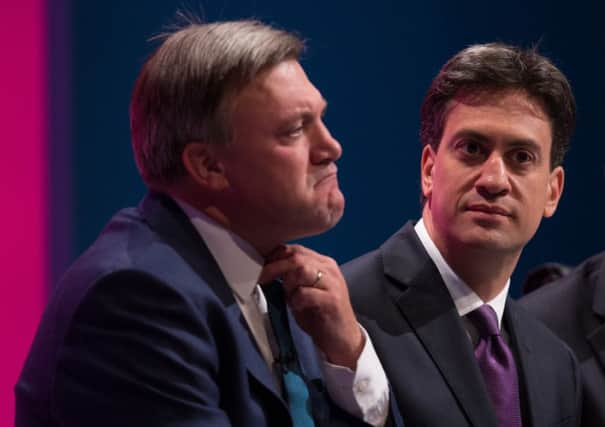Leaders: Labour have to see fairness for all in Union


Of course, to the more fervent Yes supporters, the evidence from the present Conservative-Labour slugfest supports what they maintained throughout the campaign – that only a Yes vote could deliver significant constitutional change. Since they believe that betrayal of Scottish interests is Westminster’s stock-in-trade, such a conclusion is second nature to them.
But it is also wrong. Let’s remember that Scotland voted to stay in the Union and the three UK leaders pledged in a “vow” that Scots would be rewarded for that with extra powers for the Scottish Parliament. However, it is also obvious to anyone able to look beyond the Cheviots that the Union is not working and that enhanced powers for the Scottish Parliament are only part of the solution.
Advertisement
Hide AdAdvertisement
Hide AdIt should also be evident that more powers for Scotland might well satisfy constitutional demands north of the Border, but they are also likely to exacerbate constitutional grievances elsewhere, particularly the perception that the Scottish awkward squad is getting a special deal to the disadvantage of everyone else in the Union.
The most significant of those grievances is that England is the only part of the Union without any devolution, so MPs from Scotland can vote on, some would say trample on, English domestic issues. That would turn into unplacatable protest if Scotland, say, decides to set its own income tax rates but also carries on “helping” England to set its income tax.
So Prime Minister David Cameron’s coupling of the extra devolution promise with a pledge to realise the “English votes for English matters” concept is a politically realistic assessment of what must be done. Resolution of the two issues can proceed on parallel tracks, but that does not mean they must advance at the same pace.
Scotland’s extra powers can arrive earlier so long as legislative intent for the other to be achieved is firmly maintained.
Handily for Mr Cameron, this also plays well in another political game, the general election campaign which began as soon as the referendum result was declared.
The move puts Labour in a spot. The party needs Scottish MPs to win the election but if it falls short of an overall majority in England, it clearly would have a problem if only English MPs can vote on English issues.
Ed Miliband needs to think of bigger things than just partisan advantage. The Union is stronger than it was last week, but will only remain so if governing structures are made better and fairer for all parts of the Union and not just Scotland.
A crisis unlike any we have seen
The ghastly fracturing of the Middle East, and the dreadful humanitarian cost it is exacting, keeps on rising. Turkey, which has received perhaps a million refugees from the Syrian conflict, has seen about 130,000 more arrivals in the past week fleeing from the horrors of Islamic State (IS) fanaticism.
Advertisement
Hide AdAdvertisement
Hide AdThis is more than just yet another and growing Middle Eastern humanitarian crisis. Turkey worries that perhaps 100,000 more people may join the exodus as the IS death cult besieges the Syrian border town of Kobane, capture of which would give it almost complete control of north-eastern Syria.
There is a need to supply food and shelter on a massive scale, particularly as winter now approaches. But this isn’t a crisis that can be waited out, hoping for a return to normality. Clearly, the refugees cannot return while a sect that promises only torture and death for all who are “disbelievers” of their grotesque theology remain in charge.
Many of those who fled are Kurds, whose legitimate aspirations for a national territory include Turkish Kurds and are therefore seen as a threat to Turkey’s national integrity. Understandably, many of those Kurds, and more from outside Turkey, want to fight and extinguish the IS threat.
Should they be armed and assisted? Turkey feels that would ultimately lead to the Kurdish fight for freedom extending to its soil and therefore is preventing Kurdish fighters from heading into Syria. This is a nightmare that would tax the wisdom of Solomon. But if this requires a military solution, it must be one that involves Middle Eastern ground forces supported by western intelligence and air power.